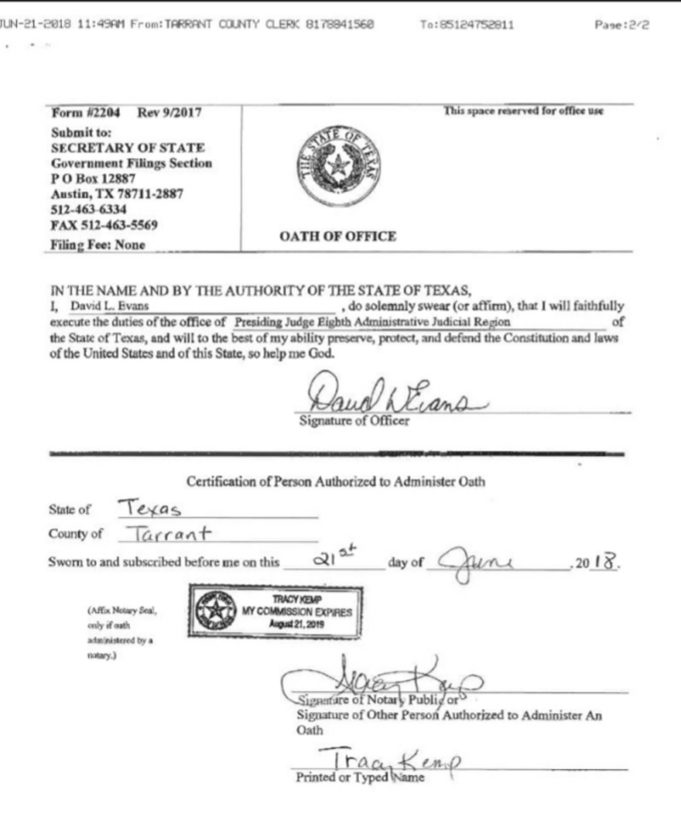As the presiding judge for the North Texas region, David Evans oversees a wide range of tasks that allow the civil, family, and criminal courts across 13 counties to function. Responding to public requests for court documents, ensuring visiting retired judges are qualified for their assignments, and coordinating time off for judges are some of the more common duties fulfilled by a regional presiding judge, and Evans has served as head of North Texas’ judicial region since 2014.
For the past four months, Evans has been the focus of continuous investigation and reporting by the Weekly. In March, our research found that Evans assigned a visiting retired judge to more than 200 criminal cases between 2015 and 2022 as a senior judge even though the retired judge was never bestowed that important title by Texas Chief Justice Nathan Hecht.
The newest problems facing Evans are tied to his apparent failure to file his Oath of Office with the Secretary of State’s office (SOS) following his recent reassignment as head of the Eighth Administrative Judicial Region, an area that encompasses North Texas. Following an election or appointment, all judges in Texas must file the Oath of Office before setting upon the duties of their office. Oaths are only valid once they are filed with the state, county, or city, depending on which type of officeholder is filing.
Two weeks ago, a confidential source sent us copies of government documents that showed Evans did not file the required oaths following his June reappointment by Gov. Greg Abbott. In an email, a spokesperson for Evans rebutted the accusation.
“Following the recent appointment, a Statement of Officer and an Oath of Office were filed with the Secretary of State, and the region has filed marked copies of the same,” the spokesperson wrote without providing proof.
After I requested copies of the oaths in question — the Statement of Officer, also known as the anti-bribery oath, and Oath of Office, both of which must be signed and filed — I was told by a SOS spokesperson that Evans did not file any oaths following his reappointment.
“A diligent search of the records of this office found no documents responsive to your request,” the SOS spokesperson responded.
The rulings and orders of judges who did not meet the constitutional requirement to take and file the Statement of Officer/anti-bribery oath and Oath of Office can and have been overturned. Article 16 of the Texas Constitution is clear: “All elected and appointed officers, before they enter upon the duties of their offices, shall take the following Oath.”
Numerous rulings by the Texas Court of Criminal Appeals and opinions by the State Attorney General have consistently upheld that rulings and actions by judges who have failed to take the Oath of Office are void. One oft-cited Court of Criminal Appeals case, French v. State, overturned the rulings of a temporarily appointed municipal judge in Hurst, Judge R.A. Hargrave, because he failed to take his Oath of Office before ruling over cases following his appointment.
The Court of Criminal Appeals’ 1978 ruling reads, “We hold that without the taking of the oath prescribed by the Constitution of this State, one cannot become [a lawful judge], and his acts as such are void.”
Through a request for records known as Rule 12, I sought copies of the original oaths that Evans must retain at his downtown office. My request to the Eighth Administrative Judicial Region was answered with copies of the recent Statement of Officer/anti-bribery oath and Oath of Office but no explanation why the SOS does not have those oaths on file, and the SOS has not returned my repeated requests for an explanation of the discrepancy.
A separate open records release from the SOS shows that Evans failed to file the Statement of Officer/anti-bribery oath, which must be filed before the Oath of Office, at the beginning of his previous appointment as head of North Texas’ judicial region. Evans’ 2018 appointment may be void due to that error and because the one oath he did take, the Oath of Office, is missing the SOS stamp that signifies it was properly filed with the state.
If Evans failed to take his oath properly on time and file it with the SOS, that misstep could jeopardize Aaron Dean’s upcoming trial. The former Fort Worth police officer stands charged with the 2019 murder of a young Black woman, Atatiana Jefferson, in 2019. In late June, Evans, following his recent reappointment, assigned visiting retired Justice Lee Gabriel to preside over the recusal of Judge David Hagerman from Dean’s case. The defendant’s lawyers successfully argued that Hagerman was biased against and hostile toward them. The validity of Evans’ assignment of Gabriel is now in question as is the authority of Gabriel to recuse Hagerman because the justice also failed to file her oaths at the beginning of her late June assignment, based on SOS findings.
As a matter of policy, the State Commission on Judicial Conduct does not confirm or comment on investigations, but a confidential source (not the one previously mentioned) sent me a copy of a recent sworn complaint filed by a former justice of the peace to the commission. It’s by Jacqueline Wright, alleges Evans falsified more than 200 government documents as a means of allowing a constitutionally unqualified judge to preside over misdemeanor and felony cases in Evans’ absence between 2015 and early this year.
Under Chapter 75 of Texas Government Code, visiting retired judges must attain senior judge status before ruling on cases as a visiting retired judge, but longtime misdemeanor judge Daryl Coffey, based on our findings, never sought or was given that title from Chief Justice Hecht (“ No Authority,” June 22). Publicly, Evans disclosed Coffey’s true title by listing him as a non-senior visiting retired judge on several annual public disclosures, but Evans privately bestowed Coffey with the false title of senior judge on rarely seen forms called Order of Assignment that are accessible only by judges like Coffey and administrative judges.
Bestowing a false title on Coffey using the Order of Assignment forms gave the appearance that Coffey was constitutionally qualified for those cases.
The falsified forms may have allowed Coffey to earn sizable money fraudulently from the county since senior judges are paid around $500 a day while on assignment.
Coffey may not be the only non-senior judge to be unlawfully assigned by Evans. A recent Rule 12 request reveals 127 Order of Assignment forms — filed between January and July of this year — for local visiting retired judges listed as non-senior on the Eight Administrative Judicial Region’s website, meaning Evans may have unlawfully assigned other non-senior judges as senior judges to criminal cases.
Evans has taken no steps to rectify Coffey’s constitutionally void assignments and has ignored our requests for comment.
Evans is far from the only Tarrant County judge aware of Coffey’s failure to seek senior judge status. Internal emails from the Tarrant County District Attorney’s office show that DA Sharen Wilson was informed about Coffey’s false title of senior judge on several occasions by DA staffers who have read our extensive reporting.
This article, reads a May 13 email addressed to DA Wilson, “is about Daryl Coffey and whether he legally presided over cases, including one against [former Justice of the Peace] Jacqueline Wright.”
Dozens of criminal court judges who requested Coffey to fill in for them during vacancies between 2015 and 2022 would reasonably have known from annually published lists of visiting retired judges eligible for assignment that Coffey was not a senior judge.











